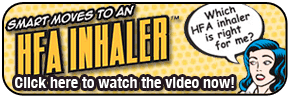How to Identify an Asthma Emergency
Knowing the warning signs could save a life.
How to Identify an Anaphylaxis Emergency
Learn which symptoms to look for.
What to Expect When Calling 9-1-1
Be prepared to handle this stressful situation.
What to Do Until Paramedics Arrive
Take these six steps while waiting for help.
The Terror, Guilt, & Doubt
A mother deals with mixed emotions when calling 9-1-1.
How to Identify an Asthma Emergency
Most asthma attacks start out slowly (over hours or days), building gradually before symptoms reach emergency status. But sometimes sudden attacks occur. Asthma symptoms can become life threatening, requiring immediate medical attention. Contact your doctor or go directly to the emergency department of the nearest hospital if you experience:
- Coughing, wheezing, shortness of breath, or tightness in the chest that does not respond to inhaled or oral medications
- Difficulty talking
- Rapid or shallow breathing
- Flared and enlarged nostrils
- Tightly-pulled skin in the neck area and/or around the rib cage with each breath
- A gray, dusky, or bluish skin color, beginning around the mouth or under the fingernails
- A peak expiratory flow rate (PEFR) that falls 50 percent below your target PEFR or that falls into the danger zone as determined by your physician
Work with your doctor to develop a personalized asthma management plan that explains what to do when asthma symptoms worsen and learn to recognize the early signs of an attack. The sooner medications are started, the easier it is to reverse an episode.
[top]
How to Identify an Anaphylaxis Emergency
Anaphylaxis, a severe and potentially life-threatening allergic reaction, can be caused by insect stings, latex, foods, and medications. An anaphylactic response occurs rapidly, often beginning within seconds or minutes of exposure to the allergen.
Symptoms of anaphylaxis may include:
- Tingling sensation and/or itching
- Hives
- Swelling of throat and mouth
- Difficulty swallowing or speaking
- Difficulty breathing
- Abdominal cramps, nausea, and vomiting
- Sudden feeling of weakness (indicating a drop in blood pressure)
- Disorientation
- Collapse and unconsciousness
- If you suspect anaphylaxis:
Don’t delay - call emergency services or 9-1-1 and get treatment immediately.
Help the patient lie down on his back and elevate the feet higher than the head. Try to keep him from moving unnecessarily.
If prescribed by your physician, administer an EpiPen® or EpiPen® Jr. Auto-Injector.
Keep the patient warm and comfortable. Loosen tight clothing and cover him with a blanket. Do not give the patient anything to drink.
[top]
What to Expect When Calling 9-1-1
Calling 9-1-1 is an important step when seeking emergency medical treatment. Knowing ahead of time what to expect when summoning help is one way to alleviate anxiety during emergency situations.
When calling 9-1-1, it’s important to keep calm. Although you may be frightened, take a moment to compose yourself so you can provide emergency dispatchers with vital information.
Once you have a dispatcher on the line, you’ll be asked to:
- Is the patient active or lethargic?
- Is the patient’s skin pale, blanched, dusky, or bluish?
- Is the patient struggling to breathe?
- Is the patient breathing rapidly, slowly, or shallowly?
In some states, the address where the phone call originates flashes on a screen at the 9-1-1 dispatch center. You may be asked to confirm this address or provide the address where you are calling from for the dispatcher.
Finally, do not hang up the phone until instructed to do so by the emergency dispatcher. Dispatchers are specially trained to assist you while waiting for an ambulance and may stay on the phone with you until emergency personnel arrive. By staying on the line, they can continue to gather information and monitor the situation as it develops.
[top]
What to Do Until Paramedics Arrive
So you’ve called 9-1-1 . . . now what?
- First, remain calm. Stay with the patient, offering support and encouragement that help is on the way.
- Follow the asthma management plan as prescribed by your physician (such as using a nebulizer or metered-dose inhaler in case of an emergency).
- If it is nighttime, turn on an outside light to help guide emergency personnel to your door.
- Have a written copy of the patient’s asthma management plan available, as well as a list of all medications currently being taken.
- If younger siblings are at home, make arrangements to have them stay with a neighbor or friend if necessary.
- Take a deep breath and try to stay calm.
[top]
The Terror, Guilt, & Doubt
It was the middle of the night when the quiet darkness of our house was shattered by the sounds of my 4-year-old’s barking cough as he gasped for air. It took only an instant to know Douglas was in serious trouble. He had a high fever combined with a nasty case of croup and asthma - a potentially lethal combination. He couldn’t audibly answer us when we asked if he could breathe, and the terror in his eyes sent chills down my spine.Although the emergency nebulizer breathing treatment was helping, it wasn’t enough. Cradling my child in my arms, I reached for the phone to call 9-1-1. The paramedics arrived and immediately took over, preparing to transport Douglas to the hospital. My husband, who had been called up from the military reserves to active duty, was leaving in the morning. Nevertheless, he insisted on riding to the hospital in the ambulance with our son. As the ambulance pulled away, I felt helpless and alone.
I was a mom in crisis mode - simultaneously pulling on clothes while making arrangements for our daughter to head over to a neighbor’s house. As I raced in our car down the deserted streets to the hospital, I was consumed with fear, guilt, and doubt. Had I done something wrong that contributed to my son’s condition? Was calling the paramedics the right thing to do? What if I overreacted? Why didn’t I see the warning signs of an impending attack? Will he be all right?
Thankfully, we did make the right decision, and the emergency room doctors were able to stabilize my son and release him after a few agonizing hours. The doctor, the nurses, and even the paramedics applauded our decision to seek emergency treatment - assuring us that calling 9-1-1 was the right thing to do. But the feelings of doubt still consumed me.
Then I recalled how a few months back I was with a neighbor whose daughter was in acute respiratory distress. It was clear to me she needed to call 9-1-1, but she wasn’t sure. She asked me the same “what if” questions. She did call the paramedics, and they were glad to be able to help. Suddenly, a light bulb went off in my head as I realized what I was feeling - the terror, the guilt, the doubt - were all normal reactions. I wasn’t alone.
As I tucked my son into bed after our trip to the hospital, I tiptoed across the street to retrieve my daughter. My neighbor answered the door and told me that while I was gone, my 7-year-old little girl was so upset from the night’s events that she crawled into bed with the neighbors and vomited all over them. I was mortified, but my neighbor said, “Don’t worry about it. I’m a mom too, you know.”
I smiled and realized parents everywhere understand that dealing with sick kids is all part of the parenting package. But sometimes parents of children with chronic illnesses such as asthma get more than they bargained for. And it’s important to know when to reach out for help, especially in emergencies.
With more than twenty years experience as a paramedic, Running Springs, CA, Fire Department Engineer Scott Jasgur has responded to countless asthma emergencies. “Parents should remember that emergency personnel are trained and ready to respond when needed - that’s our job,” he says. “If a parent thinks their child needs emergency help, they should trust their instincts. If a child has improved before we arrive, that’s wonderful, but if they don’t improve, you’ve saved precious moments by calling us.”
Just as many families have emergency plans for earthquakes, tornadoes, and other natural disasters, Jasgur recommends families have emergency medical plans in place, including a written asthma management plan from their physician to share with emergency medical personnel.
Looking back, I no longer doubt my decision to reach out for help. As I carried my daughter back home and tucked both children back into bed, I felt a great sense of relief. The sun began to rise on a new day as I wandered toward my bedroom, stepping over my husband’s Army gear and duffel bag along the way. Collapsing into bed I took comfort in knowing that while he was going off to help in the war on terrorism, I was armed with the tools and support to fight the asthma war here at home - a battle our family is determined to win.
[top]





 RSS Feed
RSS Feed